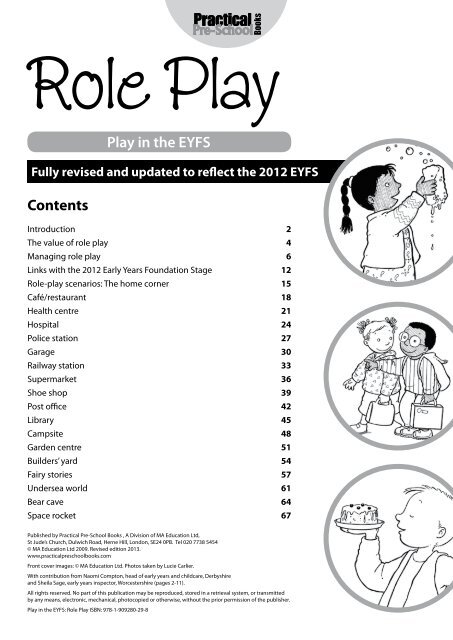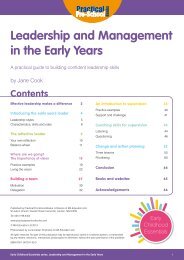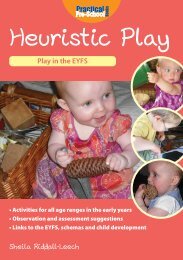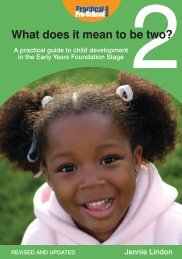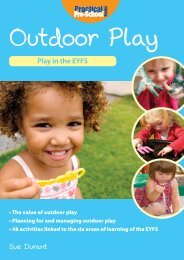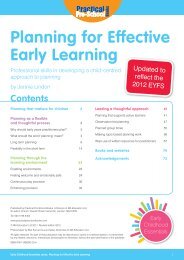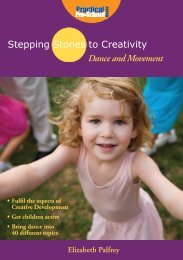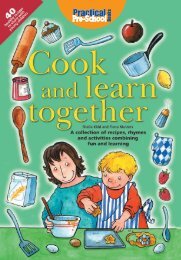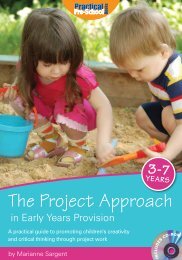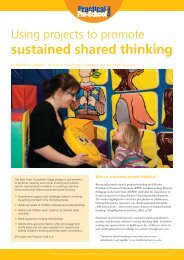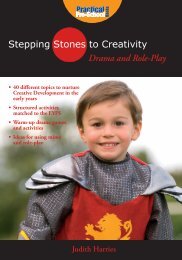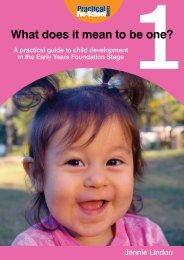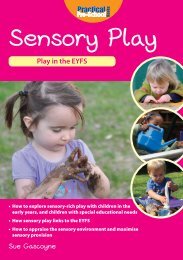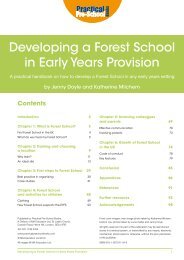Contents Play in the EYFS - Practical Pre-School Books
Contents Play in the EYFS - Practical Pre-School Books
Contents Play in the EYFS - Practical Pre-School Books
You also want an ePaper? Increase the reach of your titles
YUMPU automatically turns print PDFs into web optimized ePapers that Google loves.
<strong>Books</strong><br />
Role <strong>Play</strong><br />
Fully revised and updated to reflect <strong>the</strong> 2012 <strong>EYFS</strong><br />
<strong>Contents</strong><br />
<strong>Play</strong> <strong>in</strong> <strong>the</strong> <strong>EYFS</strong><br />
Introduction 2<br />
The value of role play 4<br />
Manag<strong>in</strong>g role play 6<br />
L<strong>in</strong>ks with <strong>the</strong> 2012 Early Years Foundation Stage 12<br />
Role-play scenarios: The home corner 15<br />
Café/restaurant 18<br />
Health centre 21<br />
Hospital 24<br />
Police station 27<br />
Garage 30<br />
Railway station 33<br />
Supermarket 36<br />
Shoe shop 39<br />
Post office 42<br />
Library 45<br />
Campsite 48<br />
Garden centre 51<br />
Builders’ yard 54<br />
Fairy stories 57<br />
Undersea world 61<br />
Bear cave 64<br />
Space rocket 67<br />
Published by <strong>Practical</strong> <strong>Pre</strong>-<strong>School</strong> <strong>Books</strong> , A Division of MA Education Ltd,<br />
St Jude’s Church, Dulwich Road, Herne Hill, London, SE24 0PB. Tel 020 7738 5454<br />
© MA Education Ltd 2009. Revised edition 2013.<br />
www.practicalpreschoolbooks.com<br />
Front cover images: © MA Education Ltd. Photos taken by Lucie Carlier.<br />
With contribution from Naomi Compton, head of early years and childcare, Derbyshire<br />
and Sheila Sage, early years <strong>in</strong>spector, Worcestershire (pages 2-11).<br />
All rights reserved. No part of this publication may be reproduced, stored <strong>in</strong> a retrieval system, or transmitted<br />
by any means, electronic, mechanical, photocopied or o<strong>the</strong>rwise, without <strong>the</strong> prior permission of <strong>the</strong> publisher.<br />
<strong>Play</strong> <strong>in</strong> <strong>the</strong> <strong>EYFS</strong>: Role <strong>Play</strong> ISBN: 978-1-909280-29-8
The value of role play<br />
Do you make <strong>the</strong> most of your role-play area With some<br />
thought about <strong>the</strong> purpose of role play, some careful<br />
plann<strong>in</strong>g and sensitive <strong>in</strong>tervention, role play can be <strong>the</strong><br />
most excit<strong>in</strong>g learn<strong>in</strong>g experience <strong>in</strong> your sett<strong>in</strong>g.<br />
Every area of <strong>the</strong> curriculum can be taught through good<br />
quality role play. Children can:<br />
• learn to share and take turns<br />
• use <strong>the</strong>ir imag<strong>in</strong>ations<br />
• explore situations from <strong>the</strong>ir own or ano<strong>the</strong>r<br />
person’s perspective<br />
• develop self-confidence and self-esteem<br />
• express ideas, feel<strong>in</strong>gs and anxieties<br />
• feel valued, listened to and taken seriously<br />
• learn to collaborate with o<strong>the</strong>r children and with adults<br />
• play a part <strong>in</strong> observ<strong>in</strong>g and assess<strong>in</strong>g both <strong>the</strong>ir own<br />
and o<strong>the</strong>rs learn<strong>in</strong>g<br />
• take risks, solve problems and make decisions<br />
Th<strong>in</strong>k about it...<br />
The value of role play is nearly always <strong>in</strong>creased if<br />
children have had <strong>the</strong> chance to experience <strong>the</strong> real<br />
situation before <strong>the</strong> scenario is set up. It may be<br />
possible to arrange a visit, for example to your local<br />
cl<strong>in</strong>ic or shops, and ask permission for <strong>the</strong> children<br />
to talk to some of <strong>the</strong> staff. Some expert adults are<br />
will<strong>in</strong>g to come <strong>in</strong> and talk to children about <strong>the</strong>ir<br />
work, demonstrat<strong>in</strong>g equipment and techniques.<br />
• have <strong>the</strong> chance to develop <strong>the</strong>ir own ideas and<br />
explore what <strong>the</strong>y want to know<br />
• construct and restructure <strong>the</strong>ir understand<strong>in</strong>g<br />
of <strong>the</strong> world<br />
• learn about <strong>the</strong> culture of o<strong>the</strong>rs and develop<br />
a greater understand<strong>in</strong>g of <strong>the</strong>ir own culture<br />
• learn more about relationships<br />
• overcome <strong>the</strong>ir fears (for example, of <strong>the</strong> dark<br />
or of hospitals or doctors).<br />
The value of play can be seen <strong>in</strong> children’s concentration and<br />
<strong>the</strong> depth of <strong>the</strong>ir exploration. Children learn best when <strong>the</strong>y<br />
are <strong>in</strong>terested <strong>in</strong> what <strong>the</strong>y are do<strong>in</strong>g and role play offers that<br />
chance for <strong>the</strong>m to be come completely absorbed.<br />
<strong>Play</strong><strong>in</strong>g is not a break from learn<strong>in</strong>g, and <strong>the</strong>re should be<br />
rigour <strong>in</strong> play which demands and challenges children<br />
to develop <strong>the</strong>ir learn<strong>in</strong>g. This means that <strong>the</strong>re needs to<br />
be negotiation between adults and children. By work<strong>in</strong>g<br />
toge<strong>the</strong>r as partners <strong>in</strong> plann<strong>in</strong>g, propos<strong>in</strong>g and decisionmak<strong>in</strong>g,<br />
you can make both <strong>the</strong> teach<strong>in</strong>g and learn<strong>in</strong>g<br />
more productive.<br />
Role play provides a l<strong>in</strong>k between free and directed<br />
play but you need to make sure that positive <strong>in</strong>tervention<br />
does not become po<strong>in</strong>tless <strong>in</strong>terfer<strong>in</strong>g. Sometimes adults<br />
can challenge to <strong>in</strong>vigorate <strong>the</strong> play and sometimes<br />
4<br />
Role <strong>Play</strong>
Manag<strong>in</strong>g role play<br />
Who ‘role plays’<br />
Children may role play on <strong>the</strong>ir own, <strong>in</strong> pairs, <strong>in</strong> small<br />
groups or <strong>in</strong> large groups. Who is <strong>in</strong>volved <strong>in</strong> <strong>the</strong> play<br />
changes <strong>the</strong> dynamics. Role-play situations may allow<br />
children to develop relationships with children that <strong>the</strong>y do<br />
not usually choose to work with.<br />
Both adults and children need to be <strong>in</strong>volved, but not<br />
necessarily <strong>in</strong> <strong>the</strong> same ways. Children should sometimes<br />
have <strong>the</strong> opportunity to lead role-play situations without<br />
feel<strong>in</strong>g restricted by adults. How children are encouraged<br />
to jo<strong>in</strong> or persuaded to have a turn can affect <strong>the</strong> play<br />
and <strong>the</strong>ir <strong>in</strong>volvement. Some children are not confident<br />
about approach<strong>in</strong>g role play and will need encouragement<br />
from an adult or <strong>the</strong>ir peers. Children <strong>in</strong>st<strong>in</strong>ctively<br />
value <strong>the</strong> importance of play, but some will need more<br />
encouragement to be <strong>in</strong>volved than o<strong>the</strong>rs. Some adults<br />
might need help to see that it is not silly and is certa<strong>in</strong>ly not<br />
a waste of time.<br />
Make sure that all children are able to participate actively<br />
with<strong>in</strong> <strong>the</strong> role-play area. All children should benefit<br />
regardless of <strong>the</strong>ir gender, ethnicity or ability.<br />
Role play encourages children to develop as <strong>in</strong>dividuals<br />
and allows both <strong>the</strong> more- and less-able to take part.<br />
Differences <strong>in</strong> children’s abilities should not result <strong>in</strong> a<br />
less valuable experience. Role play is ideal for challeng<strong>in</strong>g<br />
children to develop and enrich <strong>the</strong>ir learn<strong>in</strong>g because it is<br />
dependent upon process ra<strong>the</strong>r than a race for a product.<br />
Through role play children learn about how to manage<br />
differences between people and are able to ask questions<br />
and explore this concept.<br />
Bear <strong>in</strong> m<strong>in</strong>d that <strong>the</strong> organisation of resources can affect<br />
<strong>the</strong> development of play, particularly for some children,<br />
who will not be able to jo<strong>in</strong> <strong>in</strong> if <strong>the</strong> resources are too<br />
cluttered or <strong>the</strong> furniture is too close toge<strong>the</strong>r. O<strong>the</strong>r<br />
children may feel overwhelmed by <strong>the</strong> amount of resources<br />
or if <strong>the</strong> resources do not fit <strong>in</strong> with <strong>the</strong>ir particular way of<br />
learn<strong>in</strong>g. Talk with <strong>the</strong> children about <strong>the</strong> resources <strong>the</strong>y<br />
Th<strong>in</strong>k about it...<br />
• How do children get <strong>in</strong>volved <strong>in</strong> plann<strong>in</strong>g a<br />
situation If <strong>the</strong>y have, are <strong>the</strong>y <strong>the</strong>n more<br />
<strong>in</strong>terested <strong>in</strong> be<strong>in</strong>g <strong>the</strong> ones who use it<br />
• When role play takes place outside any def<strong>in</strong>ed<br />
area or situation. Is it part of a story, daily contact, <strong>in</strong><br />
conversation or <strong>in</strong>cidental<br />
• Do children play more when <strong>the</strong>y can choose <strong>the</strong><br />
context, time and <strong>the</strong> group<strong>in</strong>g<br />
• Are <strong>the</strong>y more <strong>in</strong>terested, and is play developed<br />
differently, if <strong>the</strong> children choose <strong>the</strong> activity<br />
ra<strong>the</strong>r than you<br />
• Do children return – or are <strong>the</strong>y encouraged to<br />
return- to ref<strong>in</strong>e, conclude, or develop play situations<br />
6<br />
Role <strong>Play</strong>
L<strong>in</strong>ks with <strong>the</strong> 2012 Early Years Foundation Stage<br />
<strong>the</strong>ir ideas, and will choose <strong>the</strong> resources <strong>the</strong>y need for<br />
<strong>the</strong>ir chosen activities. They say when <strong>the</strong>y do or don’t<br />
need help.<br />
Manag<strong>in</strong>g feel<strong>in</strong>gs and behaviour<br />
Children talk about how <strong>the</strong>y and o<strong>the</strong>rs show feel<strong>in</strong>gs,<br />
talk about <strong>the</strong>ir own and o<strong>the</strong>rs’ behaviour, and its<br />
consequences, and know that some behaviour is<br />
unacceptable. They work as part of a group or class,<br />
and understand and follow <strong>the</strong> rules. They adjust <strong>the</strong>ir<br />
behaviour to different situations, and take changes of<br />
rout<strong>in</strong>e <strong>in</strong> <strong>the</strong>ir stride.<br />
To help you with your plann<strong>in</strong>g, all of <strong>the</strong> activities<br />
suggested for each role-play area are listed under <strong>the</strong> seven<br />
areas of learn<strong>in</strong>g, both prime and specific.<br />
These pages highlight ‘Development matters’ <strong>in</strong> <strong>the</strong> 2012<br />
Early Years Foundation Stage – subdivided <strong>in</strong>to <strong>the</strong> seven<br />
areas of learn<strong>in</strong>g – and show what children are expected<br />
to be able to do <strong>in</strong> each early learn<strong>in</strong>g goal by <strong>the</strong> time<br />
<strong>the</strong>y enter Year 1.<br />
Personal, Social and Emotional<br />
Development (Prime area)<br />
Mak<strong>in</strong>g relationships<br />
Children play cooperatively, tak<strong>in</strong>g turns with o<strong>the</strong>rs. They<br />
take account of one ano<strong>the</strong>r’s ideas about how to organise<br />
<strong>the</strong>ir activity. They show sensitivity to o<strong>the</strong>rs’ needs and<br />
feel<strong>in</strong>gs, and form positive relationships with adults and<br />
o<strong>the</strong>r children.<br />
Self-confidence and self-awareness<br />
Children are confident to try new activities, and say<br />
why <strong>the</strong>y like some activities more than o<strong>the</strong>rs. They are<br />
confident to speak <strong>in</strong> a familiar group, will talk about<br />
Communication and language<br />
(Prime area)<br />
Listen<strong>in</strong>g and attention<br />
Children listen attentively <strong>in</strong> a range of situations. They<br />
listen to stories, accurately anticipat<strong>in</strong>g key events and<br />
respond to what <strong>the</strong>y hear with relevant comments,<br />
questions or actions. They give <strong>the</strong>ir attention to what<br />
o<strong>the</strong>rs say and respond appropriately, while engaged <strong>in</strong><br />
ano<strong>the</strong>r activity.<br />
Understand<strong>in</strong>g<br />
Children follow <strong>in</strong>structions <strong>in</strong>volv<strong>in</strong>g several ideas or<br />
actions. They answer ‘how’ or ‘why’ questions about <strong>the</strong>ir<br />
experiences and <strong>in</strong> response to stories or events.<br />
Speak<strong>in</strong>g<br />
Children express <strong>the</strong>mselves effectively, show<strong>in</strong>g<br />
awareness of listeners’ needs. They use past, present<br />
and future forms accurately when talk<strong>in</strong>g about events<br />
that have happened or are to happen <strong>in</strong> <strong>the</strong> future.<br />
They develop <strong>the</strong>ir own narratives and explanations by<br />
connect<strong>in</strong>g ideas or events.<br />
12<br />
Role <strong>Play</strong>
Café or restaurant<br />
(Adapt to be a hotel or pizza delivery service)<br />
Work<strong>in</strong>g and eat<strong>in</strong>g out <strong>in</strong> <strong>the</strong> role-play café or restaurant<br />
appeals to most children, especially if you can comb<strong>in</strong>e it<br />
with cook<strong>in</strong>g and eat<strong>in</strong>g real food! Suitable <strong>the</strong>mes <strong>in</strong>clude<br />
Food, Seasons and Materials.<br />
What you will need<br />
• For dress<strong>in</strong>g up: uniforms, aprons, chef’s hat<br />
• Several small tables and chairs<br />
• Tablecloths, napk<strong>in</strong>s, vases and flowers<br />
• Plates, bowls, cups and saucers, glasses<br />
• Knives, forks and spoons<br />
• Notepad and pencil<br />
• Pr<strong>in</strong>ted menus<br />
• Cook<strong>in</strong>g utensils, pots and pans<br />
• Cooker, s<strong>in</strong>k, fridge, play kitchen furniture<br />
• Telephone<br />
• Cash till, money<br />
• Leaflets advertis<strong>in</strong>g cafés<br />
• Food plastic, salt dough (see below) and real!<br />
• Fast food option take-away boxes and cups. (Most fast<br />
food outlets will supply you with a selection of <strong>the</strong>se<br />
on request)<br />
• Ingredients for cook<strong>in</strong>g.<br />
Next stop<br />
• Add on a bedroom, provide luggage and open a hotel.<br />
• Add a pizza delivery service with bicycle or<br />
scooter,helmet, boxes, menu and street map.<br />
• Close down <strong>the</strong> restaurant due to staff holidays, for<br />
redecoration or too many compla<strong>in</strong>ts and disastrous<br />
environmental health <strong>in</strong>spections!<br />
Th<strong>in</strong>gs to make and do<br />
• Make pretend food us<strong>in</strong>g a variety of materials – salt<br />
dough biscuits, cakes, sausages and chicken legs.<br />
• Cut cakes and chips out of yellow sponge foam.<br />
• Make pizzas from cardboard circles and collage materials.<br />
• Make favourite meals us<strong>in</strong>g paper plates, photos of<br />
food from magaz<strong>in</strong>es, or collage materials.<br />
Sett<strong>in</strong>g up<br />
• Decide with children what sort of café <strong>the</strong>y want to<br />
setup – fast food take-away or sit down at tables.<br />
Do <strong>the</strong>y want fish and chips, Ch<strong>in</strong>ese or Indian food,<br />
pizzas, a teashop or a posh restaurant There are lots<br />
of options!<br />
• Use two or three small tables, laid out with table cloths<br />
and place sett<strong>in</strong>gs.<br />
• Use a portable screen to separate off a kitchen area and<br />
arrange kitchen furniture.<br />
Start<strong>in</strong>g off<br />
• Talk to children about <strong>the</strong>ir experiences of eat<strong>in</strong>g out.<br />
These will vary enormously.<br />
• Read: The Tiger who Came to Tea by Judith Kerr (Harper<br />
Coll<strong>in</strong>s). What do <strong>the</strong>y like/not like about eat<strong>in</strong>g <strong>in</strong> a café<br />
• Expla<strong>in</strong> that you are open<strong>in</strong>g <strong>the</strong> café on a certa<strong>in</strong><br />
day. Ask children to come dressed up, if appropriate.<br />
Provide some real food to share <strong>in</strong> <strong>the</strong> café.<br />
• Safety: Take care not to rush around when people are<br />
carry<strong>in</strong>g trays/dr<strong>in</strong>ks.<br />
• Roles: Manager, waiter/waitress, head chef, sous chef,<br />
dishwasher, customer.<br />
18<br />
Role <strong>Play</strong>


